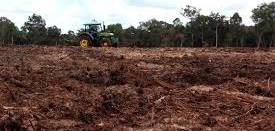
While the COP 26 has just started in Glasgow, the first announcements of agreements are starting to reach us. At the head of which this decision that the British government does not hesitate to qualify as historic. Indeed, more than 100 countries, representing nearly 85% of the forests of the planet, have committed, today, to interrupt and reverse the course of deforestation as well as land degradation by 2030. Among the signatories this agreement includes, among others, France, Brazil, the United States, the United Kingdom, Germany and Russia.
For the British Prime Minister, Boris Johnson, this agreement is synonymous with: "the biggest step forward in the protection of the world's forests in a generation" and to add that it is: "a historic agreement to protect and restore the forests of the earth . "He welcomed the fact that this resolution finally represents " a chance to end the long history of humanity as a predator of nature in order, on the contrary, to become its guardian ".
The agreement, which should be finalized very quickly, also provides for the participation of companies and financial institutions. More than 30 financial institutions, representing $ 8.7 trillion in global assets - including Aviva, Schroders and Axa - have declared themselves in favor of abandoning their investments in deforestation-related activities.
In addition, the sums devoted to the implementation of this objective are substantial. Twelve countries are set to mobilize 8.75 billion pounds ($ 12 billion) of public funds between 2021 and 2025, to which is expected to be added 5.3 billion pounds ($ 7.2 billion) of private investment. Of these funds, 1.1 billion pounds ($ 1.5 billion) will go to the protection of the Congo Basin, which is home to the second largest rainforest in the world after the Amazon.
Even if such an agreement gives every reason to rejoice, one can, however, remain skeptical about the unwavering commitment of certain countries. In particular China, Russia and Brazil. The latter who has not ceased, for years and despite incessant promises, to conduct an intensive agricultural policy leading to the large-scale destruction of the Amazon rainforest. Therefore, what credit can we give to the word given by its current leader? Let us also mention the government of the Democratic Republic of Congo "which is preparing to lift a moratorium on logging of an area equivalent to that of France."
Moreover, a number of NGOs fighting for the environment and forests also strongly doubt, recalling for example that: “Most of the signatories, including France, had already committed to putting an end to imported deforestation. in 2020 " according to the statement on France Info by Sylvain Angérant, campaign coordinator of the NGO Canopée, insisting that: " we have not achieved this objective and we are simply shifting it to 2030. It is worrying " . For its part, Greenpeace thinks that the 2030 target is far too distant and thus gives the green light to “an additional decade of deforestation . ” “Indigenous peoples demand that 80% of the Amazon rainforest be protected by 2025 and they are right, that's the right thing to do, " insisted Carolina Pasquali, head of Greenpeace in Brazil. A concern shared by the Indonesian President, Joko Widodo, whose country enjoys significant forest cover, and who said: "We s call on all countries to support sustainable development pathways that strengthen the livelihoods of communities, especially indigenous people, women and smallholders ” .
When the figures indicate that 23% of global greenhouse gas emissions come from activities such as agriculture or the forestry industry, we must hope that this agreement is not only the sum of declarations of good intentions but that on the contrary, it is the trigger for concrete actions.
Posted on 2021-11-02 11:20








Comments